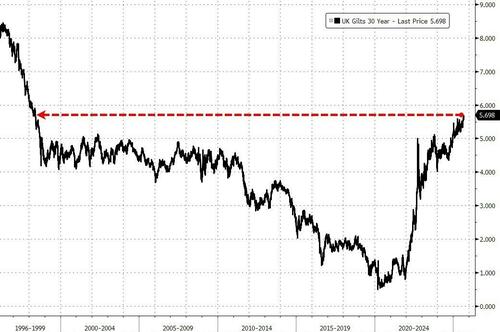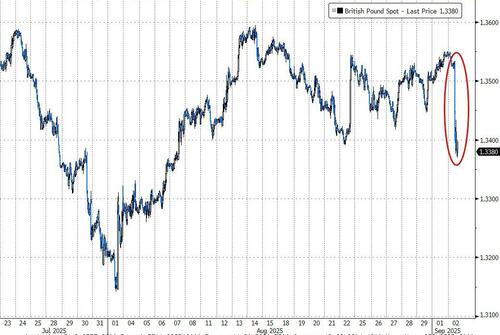“Quite Dangerous”: Gilt Yields Hit Highest In 27 Years As UK Budget Bungle Rattles Investors
UK capital markets are creaking once again as investors’ confidence in the Starmer government is crushed amid concerns over the fiscal outlook.
The yield on long-dated UK bonds rose to the highest since 1998…
Source: Bloomberg
…and the pound was pummeled…
Source: Bloomberg
…sparking a vicious circle whereby rising debt costs threaten to worsen a perilous fiscal backdrop facing Chancellor of the Exchequer Rachel Reeves ahead of her autumn budget.
Reeves is scrambling to find savings or raise taxes to plug a £35 billion ($46.9 billion) budget hole, according to Bloomberg Economics estimates. That may prove politically difficult, given the government had to U-turn on welfare reforms after a rebellion among lawmakers.
“The situation in the UK is quite dangerous at the moment because of the return of the bond vigilantes,” said Ludovic Subran, Allianz chief investment officer.
“What is striking is that it took so long to factor in the return of inflation into gilts. Forward guidance on the fiscal side will be needed.”
As Bloomberg reports, economists are predicting the UK will soon need to raise taxes to keep on the right side of the government’s self-imposed fiscal rules.
Borrowing costs are a key determinant of the UK’s fiscal arithmetic – potentially putting Reeves and Starmer at the mercy of bond yields.
“Tax rises are inevitable, but we are reaching a stage where further tax rises could become counterproductive,” said Mohit Kumar, chief European strategist at Jefferies International.
“We remain negative on the UK long end and continue to favour steepeners along the curve.”
Further shaking confidence, Starmer announced a raft of changes to his Downing Street team on Monday in a reset aimed at securing more influence over economic policy.
The main fiscal rule is that day-to-day government spending should be covered by tax revenues within five years, so that borrowing is only for investment.
“The moves Starmer made yesterday — bringing some different people into Number 10 — is kind of making people question who’s actually in charge of the fiscal side,” David Zahn, head of European fixed income at the firm, said in a Bloomberg TV interview.
He repeated his call for the 30-year yield to surpass 6%.
“I think they’re going to continue to try and just plug along and not really address the problems,” Zahn said.
“But if the yields get too high, eventually they will have to do something much more substantial which will include spending cuts.”
The rise in borrowing costs has invited comparisons to the market meltdown under former Prime Minister Liz Truss.
Eurizon SLJ Capital chief executive Stephen Jen and Joana Freire wrote Friday that the the UK risks a “Starmer Moment” similar to the fallout from Truss’s mini-budget three years ago if the government fails to restore faith in the nation’s public finances.
Tyler Durden
Tue, 09/02/2025 – 08:20ZeroHedge NewsRead More






 R1
R1
 T1
T1


